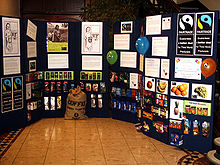|
Fair trade is an organized social movement and market-based approach that aims to help producers in developing countries make better trading conditions and promote sustainability. The movement advocates the payment of a higher price to producers as well as higher social and environmental standards. It focuses in particular on exports from developing countries to developed countries, most notably handicrafts, coffee, cocoa, sugar, tea, bananas, honey, cotton, wine, fresh fruit, chocolate, flowers and gold. In 2008, products certified with FLO International’s Fairtrade certification amounted to approximately US$4.08 billion (€2.9) worldwide, a 22% year-to-year increase. While this represents a tiny fraction of world trade in physical merchandise, some fair trade products account for 20-50% of all sales in their product categories in individual countries. In June 2008, Fairtrade Labelling Organizations International estimated that over 7.5 million producers and their families were benefiting from fair trade funded infrastructure, technical assistance and community development projects. The response to fair trade has been mixed. Fair trade’s increasing popularity has drawn criticism from both ends of the political spectrum. The Adam Smith Institute sees "fair trade" as a type of subsidy or marketing ploy that impedes growth. Segments of the left, such as French author Christian Jacquiau, criticize fair trade for not adequately challenging the current trading syst 
Display of Fairtrade products at the Derbyshire County Council head office In 1994, the European Commission prepared the "Memo on alternative trade" in which it declared its support for strengthening Fair Trade in the South and North and its intention to establish an EC Working Group on Fair Trade. Furthermore, the same year, the European Parliament adopted the "Resolution on promoting fairness and solidarity in North South trade" (OJ C 44, 14.2.1994), a resolution voicing its support for fair trade. In 1996, the Economic and Social Committee adopted an "Opinion on the European ’Fair Trade’ marking movement". A year later, in 1997, the document was followed by a resolution adopted by the European Parliament, calling on the Commission to support Fair Trade banana operators. The same year, the European Commission published a survey on "Attitudes of EU consumers to Fair Trade bananas", concluding that Fair Trade bananas would be commercially viable in several EU Member States. In 1998, the European Parliament adopted the "Resolution on Fair Trade" (OJ C 226/73, 20.07.1998), which was followed by the Commission in 1999 that adopted the "Communication from the Commission to the Council on ’Fair Trade’" COM(1999) 619 final, 29.11.1999. In 2000, public institutions in Europe started purchasing Fairtrade Certified coffee and tea. Furthermore, that year, the Cotonou Agreement made specific reference to the promotion of Fair Trade in article 23 g) and in the Compendium. The European Parliament and Council Directive 2000/36/EC also suggested promoting Fair Trade. In 2001 and 2002, several other EU papers explicitly mentioned fair trade, most notably the 2001 Green Paper on Corporate Social Responsibility and the 2002 Communication on Trade and Development. In 2004, the European Union adopted the "Agricultural Commodity Chains, Dependence and Poverty – A proposal for an EU Action Plan", with a specific reference to the Fair Trade movement which has "been setting the trend for a more socio-economically responsible trade." (COM(2004)0089). In 2005, in the European Commission communication "Policy Coherence for Development – Accelerating progress towards attaining the Millennium Development Goals", (COM(2005) 134 final, 12.04.2005), fair trade is mentioned as "a tool for poverty reduction and sustainable development". And finally, on July 6, 2006, the European Parliament unanimously adopted a resolution on fair trade, recognizing the benefits achieved by the Fair Trade movement, suggesting the development of an EU-wide policy on Fair Trade, defining criteria that need to be fulfilled under fair trade to protect it from abuse and calling for greater support to Fair Trade (EP resolution "Fair Trade and development", 6 July 2006). "This resolution responds to the impressive growth of Fair Trade, showing the increasing interest of European consumers in responsible purchasing," said Green MEP Frithjof Schmidt during the plenary debate. Peter Mandelson, EU Commissioner for External Trade, responded that the resolution will be well-received at the Commission. "Fair Trade makes the consumers think and therefore it is even more valuable. We need to develop a coherent policy framework and this resolution will help us." In 2005, French parliament member Antoine Herth issued the report "40 proposals to sustain the development of Fair Trade". The report was followed the same year by a law, proposing to establish a commission to recognize fair trade Organisations (article 60 of law no. 2005-882, Small and Medium Enterprises, 2 August 2005). In parallel to the legislative developments, also in 2006, the French chapter of ISO (AFNOR) adopted a reference document on Fair Trade after five years of discussion. In 2006, Italian lawmakers started debating how to introduce a law on fair trade in Parliament. A consultation process involving a wide range of stakeholders was launched in early October. A common definition of fair trade was most notably developed. However, its adoption is still pending as the efforts were stalled by the 2008 Italian political crisis. The Dutch province of Groningen was sued in 2007 by coffee supplier Douwe Egberts for explicitly requiring its coffee suppliers to meet fair trade criteria, most notably the payment of a minimum price and a development premium to producer cooperatives. Douwe Egberts, which sells a number of coffee brands under self-developed ethical criteria, believed the requirements were discriminatory. After several months of discussions and legal challenges, the province of Groningen prevailed in a well-publicized judgement. Coen de Ruiter, director of the Max Havelaar Foundation, called the victory a landmark event: "it provides governmental institutions the freedom in their purchasing policy to require suppliers to provide coffee that bears the fair trade criteria, so that a substantial and meaningful contribution is made in the fight against poverty through the daily cup of coffee". From Wikipedia, the free encyclopedia : Market trade in fruit and vegetables |


